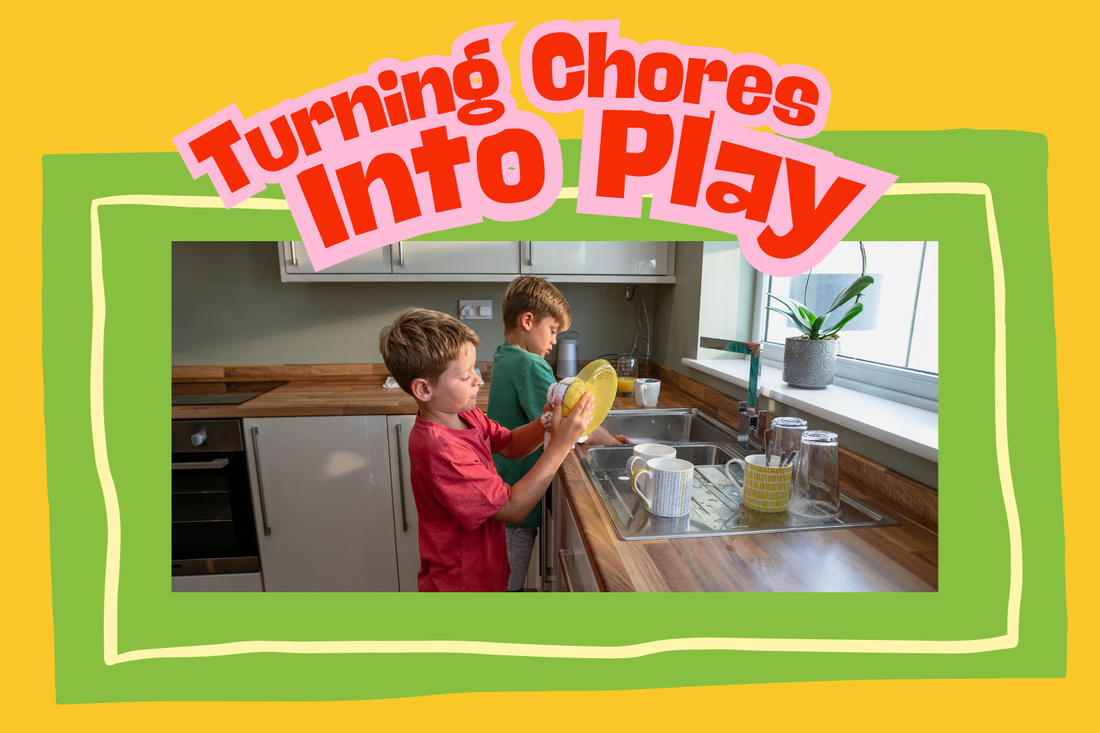
Let’s Put It in Its Place: Turning Chores Into Play—and a Lesson in Responsibility
Yes, we want cleaning up to feel fun—because fun helps things stick. But it’s not about turning everything into a game for entertainment’s sake.
When we invite our children to clean, sort, wipe, or help, we’re offering them a stepping stone to real-life responsibility. These early habits create a foundation for independence, self-worth, and pride in their environment.
Even toddlers can feel the satisfaction of completing a task—especially when they hear, “You did that yourself!” or “Look how you helped today!”
Chores aren’t just about tidiness. They’re about growing capable children—step by step, word by word, action by action.
Why the Words We Use Matter
Children are listening more closely than we think. When we call a task important, treat it with care, or recognize effort, we’re telling them: your contribution matters.
Instead of, “Pick that up,” try:
- “Let’s take care of our space.”
- “We’re helpers now, like a team!
- “Let’s put it in its place.”
These small shifts feel like play and responsibility. They turn clean-up into a shared moment of pride. You’ll start to see your child stand taller and beam after putting away a toy—not because it’s clean, but because it feels like accomplishment.
Disclaimer: Some of the links in this post are Amazon affiliate links. This means that if you make a purchase through them, Growing Juntos may earn a small commission at no extra cost to you. We only share products we truly love and think you’ll find helpful!
1. Use a Timer and Make It a Race
Set a timer and challenge your child to beat the clock:
- “Let’s see how many blocks we can put away before the music stops!”
- “Can you clean up your puzzle in 1 minute?”
🛒 Try this: Visual Timer
The visual timer helps non-readers understand how much time is left.
2. Make a Clean-Up Playlist
Create a go-to playlist that only plays during clean-up. The music cues the transition and keeps energy up. Bonus: singing builds early language and rhythm!
🛒 Our fave find: Portable Kid-safe Bluetooth Speaker
3. Assign Roles and Use Imaginary Play
Try calling your child the “Toy Detective” or “Laundry Inspector.” These little titles add fun and vocabulary.
- “You’re the Super Sorter today! Can you find all the shoes?”
- “Dish drop-off in 3, 2, 1— Action!”
🧽 4. Use Child-Sized Tools
Kids feel empowered when they have tools made just for them. It also boosts fine motor skills and confidence.
🔤 5. Label Bins or Use Storage bags and Make Sorting a Game
Use color, shape, or category to help guide clean-up.
- “Can you find everything that’s blue?”
- “Let’s put all the books in the book basket.”
🛒 Great organizer: Use organizer bags or bins for ease and good use of space
🧡 The Power of “Right Now”
One of the most powerful habits we can model is doing small things in the moment—right now, not later. When we show that wiping a table, returning a toy, or putting shoes away can happen now, not “when we get to it,” we teach children how to care for their space—and themselves.
It’s not about perfection. It’s about presence.
These micro-moments of effort become micro-moments of pride.
💬 Let’s Keep It Real
Not every moment will be magical. And that’s okay. But with consistency, creativity, and connection, chores become more than just to-dos—they become part of the rhythm of growing up, together.
Want more? Sign up for Growing Juntos emails and get fresh activity ideas and sneak peeks into our books delivered straight to your inbox.
